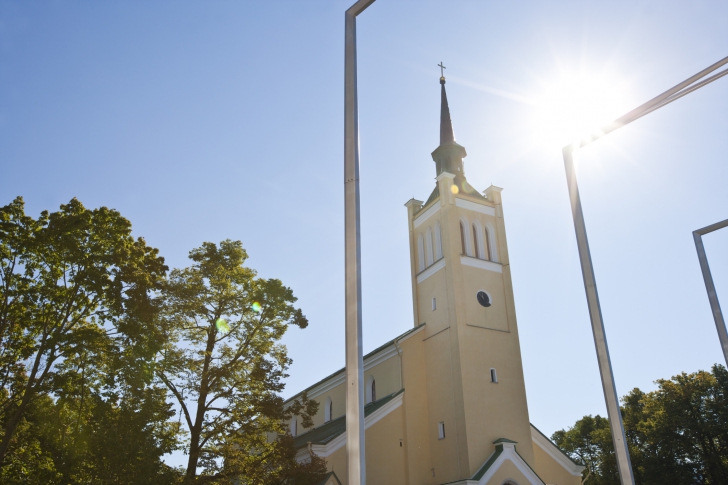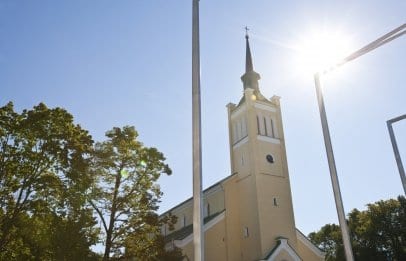“Let us consider the word, family. Why, we all have one, don’t we? We were born into a family. We have parents, siblings, relatives! Families may be spread across the city, the country or even around the world. Yes, we all have this thing called family. But that’s not the only family of which we’re a part. We are all proud members of God’s family — and the family of the Christian church. And, unlike biological families, Christ’s family is open to anyone!” The minister paused, then broke into a sudden, toothy grin. He stared out at the congregation and the half-empty pews before him.
Sitting near the back of the chapel was a new member of the congregation.
Sharp held her head in her hands, half listening, then glanced around at her fellow worshipers. I wonder if anyone else is hungover, she thought, wincing as a burst of pain pierced her left temple. Judging from the serene, attentive faces around her, and the still, unmoving backs of the people in front of her, she was the only one who was suffering — with a headache, anyway.

The minister’s thinning brown hair was combed carefully — and with the help of pomade — across his head and parted on the side. He beamed at the audience from behind circular, steel-rimmed glasses, then paused again for effect. “Every single one of you is also a part of the Grace Chapel family — a family that supports each other through the love of Christ and also through our commitment to the community of our church. Why, our tower fund is a wonderful example of the type of commitment about which I’m speaking. In a mere six months, we’ve seen the fund rise to nearly 900 dollars!” He smiled, then the smile slipped from his face and he appeared lost for a moment.
He added, quietly, “But that’s not enough. It’s not nearly enough. I ask you, as part of the Grace Chapel family — and the family of Christ — to dig a little deeper, if you’re able, so that we may restore the chapel tower to its former glory.” He looked heavenward as if beholding his magnificent tower.
Then he dropped his head and said, “In Christ’s name. Amen.”
“Amen,” the congregation whispered in response.
*
Thick, grey clouds blanketed the sky and the wind had picked up by the time the service ended. Sharp stood away from the small cluster of worshipers who were having “a word” with the minister, as Sharp’s mother had called it. Sharp remembered her mother’s insistence on speaking to the minister after each service. “How will he know we’ve been here?” she’d say, as if attendance were next to Godliness.
Sharp was staring out at the sporadic Sunday traffic on Sherbourne Street when she heard his voice.
“Huh?” Sharp spun around.
“I said, welcome to the Grace Chapel family,” the minister smiled at Sharp. He had long teeth or high gums, Sharp wasn’t sure which. He also had an overbite. Sharp liked a slight overbite in a woman, but wasn’t too sure she liked it in this gentleman.
He was still talking. “It’s very difficult getting bums in the seats, if you will!” He blushed and grinned again, showing even more teeth.
“I can imagine!” Sharp agreed. “Speaking of which, I’m interested in your tower fund. I’d like to make a donation, if I may.”
The minister’s eyes shot wide. “Oh yes, yes of course, right this way. Come along. My office is just around back, just through here, if you will, Miss — er?” Wind whipped up his vestments and Sharp was surprised to see that he was wearing a light brown, corduroy suit. She followed along as he billowed through an arched doorway.
“Sharp,” she called after him.
In a small, wood-panelled office, the minister parked himself behind his desk and held out his hand. “David Gill, nice to meet you. So, you had mentioned a donation . . . ? Cheques are fine.”
He doesn’t waste time, Sharp thought as she sat down in a ’50s-era brown leather chair. She said, “I’m acquainted with the Iverson family and I know that they give,” Sharp stressed the last word to suggest the importance of philanthropy, then added, “and it’s hard to find a good cause these days.” At the name, Iverson, Gill leaned back and nodded. “Ah, yes. The Iversons are fine supporters. Very fine. Why just the other day I was speaking to Rand about the move to more extreme, if you will, versions of Christianity and how it’s affecting both our businesses!” He smiled again as he removed a pen from its holder.
He wants me to sign a cheque, Sharp thought, biting her lip. But Gill didn’t notice. He was still talking. “Of course, Rand takes his religion very seriously.” He paused, and smiled, then suddenly added, “As do I, of course! But one has to do what one can to attract the masses — so to speak! Why, just the other day, we had two young people playing guitars during the service, of all things!” He threw his hands in the air, then smiled at Sharp.
The pen moved toward Sharp.
“I was actually planning to drop by Rand’s place this afternoon. To give him my condolences,” Sharp said.
Gill sat up straight. “Yes, a terrible tragedy. Poor Claire. Such a lovely girl.”
Gill’s fingers pushed the pen closer to Sharp.
“Do give Rand my very best regards. Such a beautiful home he has,” Gill said, wistfully. “Right on the edge, as it were.”
“Pardon?” Sharp leaned forward.
“Oh, I presumed you were referring to the Beaches house. He’s bought another?”
“No, I mean, yes, that’s the one,” Sharp said hurriedly.
Gill looked oddly at Sharp. His head tilted to the side. “About that donation . . . Miss Sharp?”
Sharp wetted her lips. She wanted to run — to get out of the minister’s cramped, stuffy office. “Do you have any information on the tower fund? I’d like to read about your plans first, if I may. Please?”
Gill reached into a desk drawer and pulled out a photocopied, black and white pamphlet. He placed it in front of Sharp.
“There,” he said, unsmilingly. He stood up and moved to the doorway. Sharp jumped up, grabbed the pamphlet and turned to leave.
“Thanks,” Sharp said, then smiled briefly at Gill as she passed through the doorway.
“You’re welcome,” he answered, without emotion.
Sharp headed for the exit fast.
*
Sharp walked quickly along on a stone path that lead from the church to the street where her beige K-car was parked half a block away.
Sharp swallowed, slowed her pace and glanced around without turning her head.
Someone’s watching me, she thought to herself.
Except that no one was around. The congregants had dispersed back to their homes. Because it was Sunday, the shops were closed. Only a few people were on the sidewalks — an elderly man walked an elderly dog. Across the street, two punks walked north, smoking cigarettes. On the road, a green Honda drove by.
I’m probably just imaging it, she thought to herself. But the twitchy feeling between her wing bones persisted. Even the fine, blond hairs on the back of her neck were standing up.
Sharp arrived at her K-car. She walked purposefully over to the driver’s side door, unlocked it and climbed in.
If someone’s watching me, maybe they’ll follow me, too, Sharp thought, as she put the car in gear and steered it into the road.
But when she looked in the rear view mirror, an empty street stared back at her.


 Why you can trust Xtra
Why you can trust Xtra


